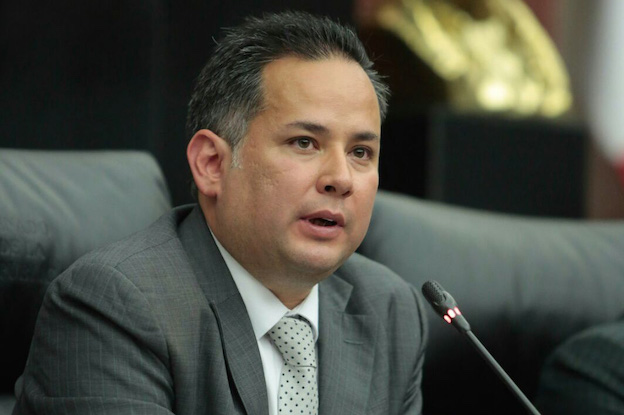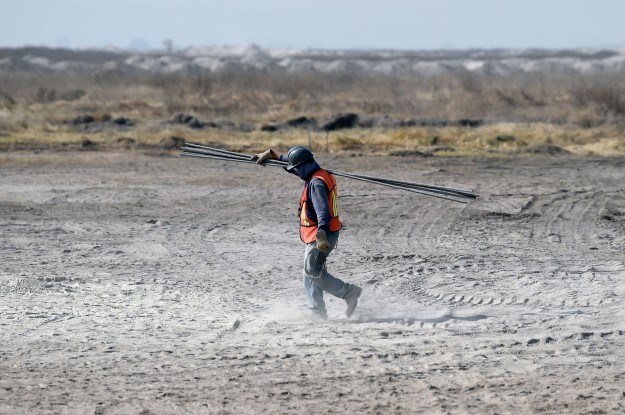MEXICO CITY – Andrés Manuel López Obrador’s election last July gave more than one down-and-out civil servant a new lease on public life. But few have enjoyed such an improvement in fortunes as Santiago Nieto.
Nieto, 46, looked like an up-and-comer when he became Mexico’s chief prosecutor for electoral crimes under former President Enrique Peña Nieto in 2015. That all changed after Nieto claimed in an October 2017 interview that Emilio Lozoya, a former Pemex director and Peña Nieto campaign aide, had pressured him to clear his name in a bribery case tied to the 2012 presidential race.
It was a misstep that would cost Nieto his job. Lozoya said that the public comments were misleading and had violated his right to due process; the acting attorney general at the time, a Peña Nieto ally, agreed. A few days later, Nieto was gone – and the case against Lozoya was falling apart.
But a lot can change in a year and a half.
On July 5, prosecutors obtained a warrant for Lozoya’s arrest for allegedly receiving Odebrecht bribes during the 2012 campaign. Lozoya maintains his innocence, and has appealed the order. But he has also in recent weeks faced separate corruption allegations related to business dealings during his time at Pemex.
Nieto has played a key role in every instance. After rejoining the political fold in support of López Obrador’s presidential campaign last year, Nieto in December became head of the finance ministry’s Financial Intelligence Unit (UIF) – the same unit that has now frozen bank accounts belonging to Lozoya and his family as part of the renewed corruption investigations against him.
Lozoya isn’t the only one to be caught in the UIF’s net. Under López Obrador, the agency has played a central part in the government’s anti-corruption plans.
Through the first six months of the year, the UIF has frozen nearly $250 million in assets and blocked accounts belonging to over 1,000 people, compared to $1.4 million and 25 people in the same period in 2018, according to government figures.
“It’s a radical change that’s not down to any new legal capacity, but rather (Nieto’s appointment) and a shift in the government’s strategy,” Pablo Montes, the anti-corruption coordinator at Mexico City-based think tank IMCO, told AQ.
Financial intelligence units are an essential piece of the anti-corruption puzzle, Montes said, because they can uncover who has benefitted from a possible economic crime like money laundering.
The UIF is designed to monitor and provide information on illicit financial activity to prosecutors – not to conduct investigations itself. But Nieto has been front and center in the administration’s anti-corruption push, occasionally informing the media about ongoing cases at López Obrador’s daily press conferences.
Nieto’s high profile has opened the UIF up to criticism – and concern that the agency could be used selectively to pummel the administration’s opponents.
In February, for example, Nieto participated in a press conference detailing possible financial crimes committed by Guillermo García Alcocer, then president of Mexico’s energy regulatory commission. At the time, López Obrador was in open conflict with García and was perceived to be trying to push him out the door. That the investigation of financial crimes faded away after García resigned suggests “a pretty clear instance of political interference,” said Montes.
Then, earlier this month, the UIF announced it would examine accounts belonging to Alberto Elías Beltrán – the former acting attorney general who oversaw Nieto’s dismissal in 2017.
Beltrán accused Nieto of seeking personal retribution, to which Nieto responded on Twitter saying that “no UIF analysis is the result of personal interests.” Either way, experts say the UIF would benefit from greater institutional controls to ensure its independence.
Eduardo Bohórquez, executive director of Transparencia Mexicana, told AQ he welcomed a more prominent role for the UIF in Mexico’s fight against corruption, but said he hoped its heightened public profile would offer an opportunity to discuss ways that the agency can be improved.
“So far (the change at the UIF) is thanks to Nieto’s personal style,” Bohórquez said. “What we need to see is an institutional transformation … to ensure it becomes a more democratic and well-monitored organization.”
Even so, the fact that the administration views the UIF, as well as tax authorities and financial regulators, as part of its anti-corruption strategy is already a positive sign, Bohórquez said.
“We’re finally starting to recognize corruption not as a moral issue, but as an economic crime,” said Bohórquez. “And if it’s an economic crime, then you can follow it through all of the structures that make it possible.”
For administration supporters, the UIF also offers a counterpoint to criticism that López Obrador’s anti-corruption strategy lacks substance – and is based solely on the belief that his own good example will do more to stop corruption than would stronger institutions.
A true test of the UIF’s institutional capacity – and of the administration’s willingness to pursue corruption cases to their final conclusion – lies ahead.
“If this investigation ends with Lozoya, then we’ll be left with a scapegoat and that’s all,” said Montes. “He’s a significant figure. But if he’s proven guilty it won’t be because he was the only one involved.”
—
Russell is a senior editor and correspondent in Mexico City for AQ. Follow him on Twitter @BenPaulRussell









